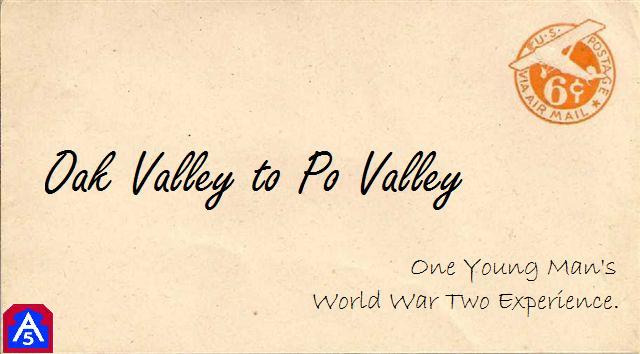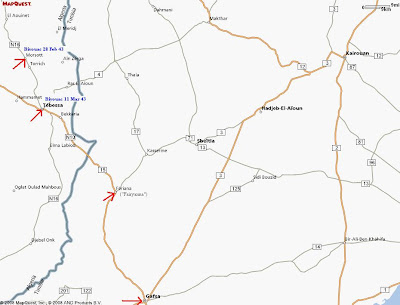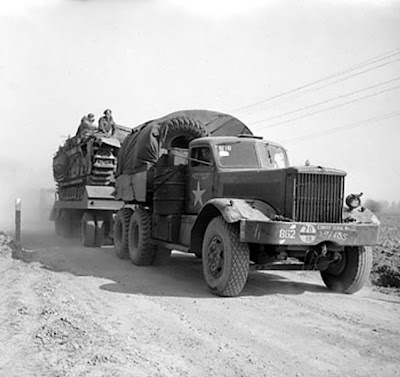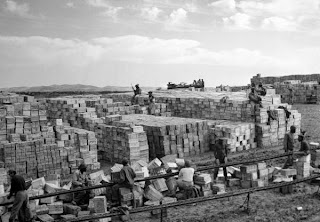Area of operations.
Saturday, March 6, 1943
Go on another 15 miles to get troops. Part of us get lost.
Sunday, March 7, 1943
Start out early in a.m. Drive 292 miles on trip. I had bad belly ache when I get back in afternoon. Company moves to Tebessa.
Monday, March 8, 1943
Move back to Morsot this a.m. We go to front, pick up French colored troops.

I scribbled a quick French lesson in my diary prior to hauling the French-speaking Senegalese troops.
Tuesday, March 9, 1943
Colored troops relieve 26th Inf. We bring 26th to Tebessa. Four of our trucks tip over last night (dark, rain, slippery). The French colored troops (Singlese) [Senegalese] lost more men in these accidents then they ever did in combat.
Wednesday, March 10, 1943
Back in camp, other driver takes truck out.
Thursday, March 11, 1943
We move camp to other side of Tebessa.
Friday, March 12, 1943
Other driver takes truck. I sent $150 home today.
Saturday, March 13, 1943
47 trucks go out. Haul 16th Inf. to make final drive against enemy. Two drivers in each truck.
U.S. infantry navigates the rough terrain in Tunisia. This region presented challenging and treacherous driving conditions, especially in the rain. [courtesy: U.S. Army Signal Corps]
Sunday, March 14, 1943
Stop at 2 a.m. Camp all day.
Monday, March 15, 1943
I go in convoy with truck. Leave 16th Inf. and pick up 26th Inf. Take them to Fairyanna. Arrive back with 16th Inf. at 1:30 a.m.
Tuesday, March 16, 1943
Take 16th to Gafsa. Get back to our company at 3 a.m.
True Story: Near the front lines some American GI's were buying eggs from an Arab farmer. They wanted something else to eat besides the same old stuff everyday. One day as they were going to buy some eggs, as they neared the place they saw a group of Germans approaching from the opposite direction. The Germans went to the house and bought some eggs. After the Germans left, the Americans went down and bought some eggs.
Wednesday, March 17, 1943
Rest in camp all day.


Motor Vehicle Operator's Permit, dated March 17, 1943, is finally issued to me. Certification reads: "I certify that Howard W. Branstner has demonstrated proficiency in driving the types of vehicles listed below as per signed authentication: Trucks, cargo 1/4 to 1 1/2 ton; Trucks, cargo, 2 ton & larger. Signed, John A. Thomas, 1st Lieutenant."
Thursday, March 18, 1943
I leave in afternoon. Take load of ammo close to front. Get back at 10 p.m. Get bent fender.
Saturday, March 20, 1943
Truck goes out. Gets back next morning.
Sunday, March 21, 1943
Stay in camp and rest.
Monday, March 22, 1943
I get load of gasoline on truck and come back to company at nite.
Tuesday, March 23, 1943
Other driver unloads truck at rail head. I leave at 9 p.m., take ammo to front (Gafsa).
Wednesday, March 24, 1943
Get back at 9 a.m. Drive 190 miles on the trip.
Thursday, March 25, 1943
Partner comes in from trip last nite. I get up at 10 p.m. and get load of rations, bring back to company. Arrive at 11:30 p.m.
Friday, March 26, 1943
Partner takes rations to Gafsa. I meet him at Boshepka and I get ammo. Take to Gafsa, arrive home at 11 p.m.
Saturday, March 27, 1943
Other driver goes out. Gets back at 7 p.m. I get shot [vaccine] in arm, same last Saturday.
Sunday, March 28, 1943
Other driver is out again today. He gets back and I start out at 9 p.m.
Monday, March 29, 1943
I get back at 10 a.m. Hauled ammo to Gafsa.
Tuesday, March 30, 1943
Truck out.
Wednesday, March 31, 1943
I'm out on haul. This work continues.


















































